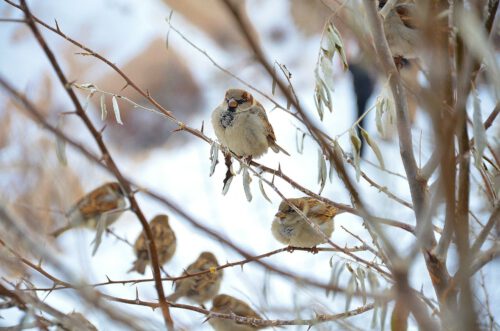Researchers have found that the same laws that characterize the "free economy" of humans also exist in social animals
Researchers from Tel Aviv University wanted to examine how sparrow birds behave in a situation of a "competitive food market", and whether in this situation those birds, who are experienced in finding food, sweep "the whole pot" while the others try to learn from them, or whether the latter learn to manage in other ways. The researchers found that the same laws that characterize the "free economy" of humans also apply to social animals, such as sparrows, which instead of fighting each other prefer to look for new food channels, which will allow them all to eat to their fill. The researchers explain that this is analogous to two owners of falafel stands operating on the same street, that in order to avoid competition for the same customers, one of them would prefer to close the falafel stand and open a shawarma stand in its place.
Small economists with flight
As part of the study, the researchers taught the sparrows to find food buried in holes scattered over a wide area, based on color or shape signs. Some sparrows became in this way those who know how to find food by color, for example looking under a purple sign and not under a green sign, while others specialized in finding food by a certain shape, such as an X or a circle. The food provided was limited and adapted to the number of sparrows in the group.
Later, the researchers added new sparrows to the experienced sparrow flocks. Now they wanted to check whether the sparrows who joined would copy the method of finding food from the experienced sparrows or would they look for new sources of food. The hypothesis was that if they copied their friends, they would indeed learn the correct color or shape more quickly, but a 'flock after the herd' would result in everyone competing for the same type of food.
To the joy and surprise of the researchers, the birds showed great economic wisdom, and instead of being dragged into competition with the old sparrows and risking that some of them would be left without food - they began to search the area for new sources of food. This is how they learned that precisely the use of a sign that is not used by the old members of the group guarantees them greater success, something that also characterizes the free market economy of humans, which uses various mechanisms to reach market equilibrium.
The research was conducted by Prof. Arnon Lotem and PhD student Naama Elhadef from the School of Zoology and the Steinhardt Museum of Nature, and Prof. Luc-Alain Giraldo from the National Research Institute in Quebec, Canada, and it was published in the journal Proceedings of The Royal Society of London B
Entrepreneurs with a source
"The long-term research on many groups of sparrows has taught us that under conditions of competition, the animals will not necessarily follow the herd and will not try to imitate their friends, but will prefer to find alternative ways in which they will find what they want," says Prof. Arnon Lotem and concludes: "No less important From this, the research made us understand the relatively simple learning process that allowed the sparrows to reach the right conclusion even without strategic thinking or financial advice. It turns out that even among the animals we find both the conformists who act like everyone else and the original entrepreneurs, who find success where no one else has looked for it."

